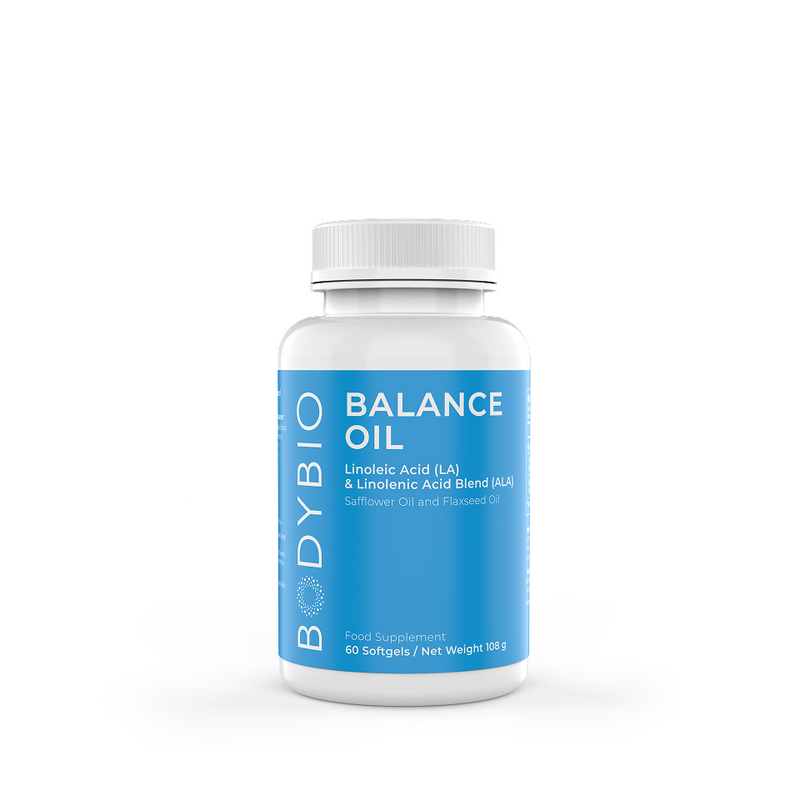Fatty Acid Testing: What It Is, How It Works, and 5 Key Health Insights
Key Takeaways:
Fatty acids may be small, but they play a big role in your overall health. From supporting brain function to maintaining heart health, essential fatty acids (EFAs) are fundamental building blocks of wellness. But how do you know if your body has the right balance? That's where fatty acid testing comes in. In this article, we'll explore what fatty acid testing is, how it works, and what valuable insights it can offer about your health journey. Whether you're new to the idea or you've been considering testing for a while, this guide will give you the foundation you need to move forward confidently.
Table of Contents:
- What Is Fatty Acid Testing?
- How Fatty Acid Testing Works
- 5 Key Insights You Can Gain from Fatty Acid Testing
- Why Your Doctor Might Recommend Fatty Acid Testing
- Supporting Optimal Fatty Acid Balance with BodyBio
- Using Fatty Acid Testing to Guide Your Health Journey
What Is Fatty Acid Testing?
Fatty acid testing is a lab analysis that measures the levels of various fatty acids present in your blood. These tests assess the balance between key fatty acids like omega-3 and omega-6, as well as other EFAs critical for cell membrane function, inflammation regulation, and metabolic health.
Your fatty acid profile offers a detailed snapshot of your body's biochemical landscape. It can reveal hidden imbalances, deficiencies, or excess fatty acids that may otherwise go undetected, providing essential clues for personalized health support.
What Are Essential Fatty Acids (EFAs)?
Essential fatty acids are crucial nutrients your body needs but cannot manufacture on its own. Instead, these nutrients come from dietary sources or supplementation. There are two primary categories of EFAs:
- Omega-3 fatty acids (including ALA, EPA, and DHA), found in fish, flaxseed, walnuts, and certain types of algae
- Omega-6 fatty acids (including linoleic acid), sourced from vegetable oils, nuts, and seeds
Both types of EFAs are critical for maintaining cellular health, supporting immune function, and regulating inflammatory responses. However, it's not just the presence of these fats that matters, the balance between omega-6 and omega-3 plays a key role. Modern diets often tilt heavily toward omega-6, and without enough omega-3 to balance it out, the body can become prone to chronic inflammation — potentially impacting long-term health outcomes.
We must also consider the quality and purity of the EFAs we consume. Pure omega-6 fatty acids from whole foods and minimally processed oils are critical to cellular health, while toxic and rancid omega-6 from oils processed with high heat are just about the worst possible fuel for our cells.
Why Fatty Acid Balance Matters for Health
Achieving the right balance of essential fatty acids (EFAs) is critical in maintaining your overall well-being. A healthy fatty acid profile supports several foundational areas of health:
- Brain Health: Brain and nervous system function, enhancing memory, mood, and cognitive resilience
- Heart Health: Cardiovascular health, helping to regulate blood pressure, reduce triglycerides, and support healthy circulation
- Joint Support: Joint flexibility and comfort, promoting ease of movement and reducing stiffness
- Skin Wellness: Skin integrity and hydration, keeping the skin barrier strong and resilient
- Immune Function: Immune system regulation, aiding the body's natural defenses and inflammatory balance
When fatty acids fall out of balance, even minor imbalances can create ripple effects that impact your long-term health. Fatty acid testing offers an important opportunity to catch these shifts early, giving you the tools to adjust your diet and supplementation strategy with greater precision and lasting benefits.
How Fatty Acid Testing Works
Fatty acid testing is a straightforward process, but the method and what's measured can vary depending on the type of test you receive. Some tests provide a real-time snapshot of your current dietary intake, while others reveal longer-term trends in fatty acid status.
The choice between these tests depends on your health goals and the type of information you're seeking. Working with a knowledgeable practitioner can help you select the test best suited to your needs, making sure you get the most useful insights to support your wellness journey.
The most common forms of fatty acid testing include:
|
Test Type |
Description |
|
Blood spot test |
A small blood sample collected via finger prick, often used for at-home testing. |
|
Plasma test |
Measures fatty acids in the liquid portion of your blood; reflects recent dietary intake. |
|
Red blood cell (RBC) test |
Analyzes fatty acids in red blood cell membranes, offering a long-term view of fatty acid status over several months. |
What to Expect During the Testing Process
If you're doing a fatty acid blood test with your doctor, it usually involves a standard blood draw. For free fatty acid testing kits you use at home, you'll prick your finger, collect a few drops of blood, and send it to a lab for analysis.
Results typically take 1–2 weeks, depending on the testing provider. Your report may outline your levels of:
- Omega-3s (ALA, EPA, DHA)
- Omega-6s (AA, LA)
- Monounsaturated (omega-9) fatty acids
- Saturated fatty acids
Your healthcare provider can help interpret your results and recommend next steps.
5 Key Insights You Can Gain from Fatty Acid Testing
Fatty acid testing can reveal valuable information you might not otherwise have access to. It offers a deeper look into the essential building blocks that influence everything in your body from energy production to inflammatory balance.
1. Your Omega-3 to Omega-6 Ratio
One of the most important insights fatty acid testing provides is the ratio of omega-3 to omega-6 fatty acids. This balance plays a significant role in managing inflammation and overall health. Ideally, a healthy ratio falls around 1:4 omega-3 to omega-6. However, typical modern diets tend to tip heavily toward omega-6 dominance, which can contribute to chronic inflammation and a variety of health concerns over time.
2. Signs of Inflammation or Deficiency
Fatty acid testing can reveal subtle shifts in your body's nutrient status long before symptoms become obvious. Deficiencies or imbalances in key fatty acids may point to issues with dietary intake, absorption, or metabolism. By identifying these patterns early, you can proactively adjust your nutrition and supplementation to support optimal energy levels, immune resilience, and long-term health.
3. Insights Into Cardiovascular and Brain Health
Two of the most critical systems impacted by fatty acid balance are the cardiovascular and nervous systems. Low levels of omega-3s like EPA and DHA have been linked to higher risk for heart disease, cognitive decline, and mood disorders. By assessing your fatty acid profile, you gain valuable insights that can inform strategies to protect heart health, enhance memory, and even support mental and emotional well-being before more serious issues develop.
4. Personalized Nutrition and Supplement Recommendations
Testing gives you a detailed map of where you need to focus dietary changes and lifestyle adjustments. You may find that increasing your omega-3 intake through foods like wild-caught fish or flaxseed becomes a priority, or that reducing consumption of processed omega-6 oils is necessary to restore balance. In some cases, supplementation with a high-quality product like BodyBio Balance Oil can offer targeted support to help correct imbalances more efficiently. These personalized insights make it easier to implement changes that align with your body's unique needs and long-term health goals.
5. Monitoring Therapeutic Progress Over Time
If you're already working on improving your fatty acid profile, regular testing provides a measurable way to track your progress over time. Rather than relying on guesswork, you can use concrete data to see how your dietary changes and supplementation efforts are impacting your health. This ongoing feedback not only helps refine your wellness strategy but also offers motivation by highlighting tangible improvements in your fatty acid balance.
Why Your Doctor Might Recommend Fatty Acid Testing
Fatty acid testing isn't just for those with existing health concerns. Doctors may recommend it for a variety of reasons, often as part of a proactive approach to wellness. Testing can provide a more complete view of your health, uncovering imbalances that standard blood panels might miss.
Persistent symptoms like chronic inflammation, joint pain, fatigue, poor memory, mood changes, or skin issues can prompt a doctor to investigate fatty acid status. Inflammation-related conditions like arthritis, heart disease, diabetes, and autoimmune disorders often involve shifts in fatty acid balance. Similarly, if neurological concerns such as cognitive decline or mood disorders are present, understanding DHA and other EFA levels can offer important clues for intervention.
Cardiovascular risk is another major reason for testing. Even if standard cholesterol panels appear normal, imbalances in fatty acids could hint at hidden vulnerabilities in heart and vascular health. Additionally, for women who are pregnant or planning to conceive, monitoring omega-3 levels is essential for supporting fetal brain and eye development.
Fatty acid testing can also be valuable for tracking the effectiveness of nutritional therapies or supplement regimens over time — helping both practitioners and patients make more informed, personalized health decisions.
Fatty acid testing gives you valuable information, but real results come from the steps you take next to restore balance.
Supporting Optimal Fatty Acid Balance with BodyBio
Optimizing your fatty acid balance isn't complicated — but it does require targeted support. In addition to a balanced diet rich in wild-caught fish, flaxseed, chia seeds, and healthy oils, supplementation can offer a simple way to restore harmony.
BodyBio Balance Oil is uniquely formulated to provide a pure, balanced ratio of omega-6 to omega-3 fatty acids, helping rebuild a strong EFA foundation.
Balance Oil is always:
- Sourced from the highest-quality organic oils using low-temperature expeller-pressed technology to preserve the critical nutrients found in these delicate fatty acids
- Scientifically designed to match the body's ideal fatty acid balance
- Free of additives and contaminants often found in conventional oils
- Third-party tested and verified for purity and potency
Incorporating Balance Oil into your daily regimen can support:
- Brain and cognitive function*
- Skin hydration and elasticity*
- Cardiovascular wellness*
- A healthy inflammatory response*
Using Fatty Acid Testing to Guide Your Health Journey
Fatty acid testing is more than just a lab result — it's a powerful tool to guide your health journey. By learning your personal fatty acid profile, you can take proactive steps to balance inflammation, boost brain health, and support overall health and wellness.
Whether you're looking to fine-tune your wellness strategy or address lingering health concerns, fatty acid testing offers actionable insights you can trust. Combined with the right nutritional foundation, including pure, high-quality supplementation like BodyBio's Balance Oil, it becomes a cornerstone for long-term well-being.







